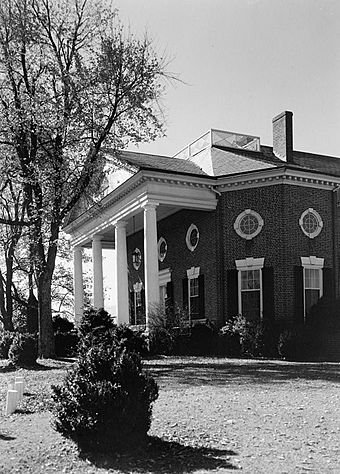Farmington (Albemarle County, Virginia) facts for kids
|
Farmington
|
|

Farmington, HABS Photo
|
|
| Location | West of the junction of US 250 and US 29, Charlottesville, Virginia |
|---|---|
| Area | 10 acres (4.0 ha) |
| Built | 1780 |
| Architect | Thomas Jefferson |
| Architectural style | Early Republic, Jeffersonian |
| NRHP reference No. | 70000782 |
Quick facts for kids Significant dates |
|
| Added to NRHP | September 15, 1970 |
Farmington is a historic house located near Charlottesville, Virginia. It's in Albemarle County, Virginia. This house was greatly expanded with a special design by Thomas Jefferson. He was the third President of the United States at the time.
The original house was built in the mid-1700s. It was for a person named Francis Jerdone. The property was very large, about 1,753 acres. In 1785, Jerdone sold the land and house to George Divers. Divers was a good friend of Thomas Jefferson. In 1802, Divers asked Jefferson to design an addition to the house. Today, Farmington has been made even larger. It now serves as a clubhouse.
What Does Farmington Look Like?
Thomas Jefferson's addition is the main part you see today. It has a unique shape. It's like a long, eight-sided room. This long room connects to a large front porch. This porch has four columns.
The original house had two stories. It was made of brick. It had three sections and a basement. Jefferson's new part was added to the east side. The porch on the addition goes up two stories. It has a main entrance door in the middle. On each side of the door are tall windows. These windows go all the way to the floor. Above these windows and the door are round windows. These let light into the upper level.
On either side of the main porch are sections that stick out. They are shaped like half-octagons. They also have windows that match the central part. When Jefferson designed it, the long octagon was split into two rooms.
Over the years, the inside of the house changed a lot. There was a fire in the mid-1800s. After that, a central hallway was added. A second floor was also built over the whole addition. In 1929, when the property became a country club, the second floor was removed. The three main spaces were then combined into one large room. The house was also made much bigger at the back. New areas were added for dining and other services.
Farmington's Impact
Farmington was carefully studied by a historian named Fiske Kimball. He was an expert in architecture at the University of Virginia. Kimball liked the design so much that he used it for his own home. His home is called Shack Mountain. It is now a National Historic Landmark. This means it's a very important historic place in the United States.
Farmington itself was added to the National Register of Historic Places on September 15, 1970. This list includes places that are important to American history.
 | Janet Taylor Pickett |
 | Synthia Saint James |
 | Howardena Pindell |
 | Faith Ringgold |



